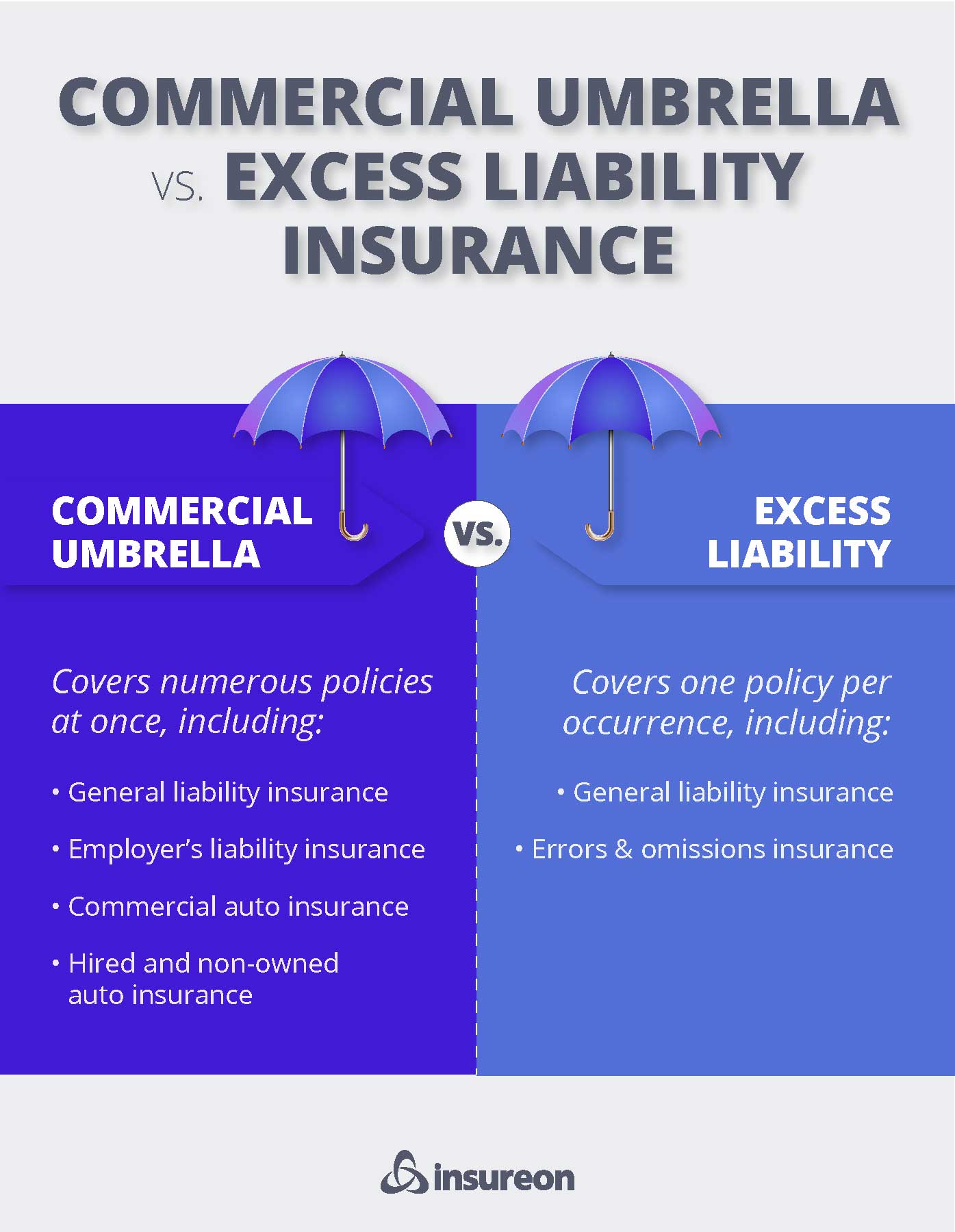
Commercial umbrella vs. excess liability insurance
Though the terms are sometimes used interchangeably, commercial umbrella insurance and excess liability insurance do not refer to the same policy. Learn about important distinctions.
What's the difference between commercial umbrella and excess liability insurance?
The policies are similar, but commercial umbrella insurance and excess liability insurance have one important difference.
- Excess liability insurance provides additional coverage for only one of your liability insurance policies, typically general liability or errors and omissions (E&O), also called professional liability insurance. It activates when that policy reaches its limit.
- Commercial umbrella insurance provides additional coverage for several of your liability insurance policies, including general liability, employer's liability (part of workers' compensation), commercial auto, or hired and non-owned auto insurance. It kicks in when one of the underlying policies reaches its limit.
Both commercial umbrella and excess liability insurance will likely have the same coverage terms, conditions, and exclusions as the underlying policy. They provide coverage when the underlying policy’s per-occurrence or aggregate limits are exhausted.
A key differentiator is that excess liability is typically "following form," strictly matching the terms of the underlying policy, whereas a commercial umbrella policy may sometimes offer broader coverage, potentially filling gaps where the underlying policy provides no coverage (often subject to a self-insured retention (SIR) or deductible).
These policies protect small businesses from catastrophic losses. By adding more coverage when your liability policies are maxed, umbrella and excess liability insurance reduce the chance of an escalating lawsuit bankrupting your business.

How much does commercial umbrella or excess liability insurance cost?
Most small businesses purchase commercial umbrella or excess liability insurance to fulfill a client's or landlord's requirement for a certain amount of coverage. Typically, you'd buy an underlying liability insurance policy with up to $2 million per-occurrence / $4 million aggregate limits and then add umbrella or excess insurance for higher limits.
Commercial umbrella insurance costs about $40 per month for each additional $1 million of coverage. While excess liability insurance is generally considered a more affordable option, both policy types are a cost-effective way to secure high liability limits. The final price you pay depends on several factors, including your industry's risk level, your business size and revenue, location, and claims history.
Who needs commercial umbrella or excess liability insurance?
Small businesses that benefit from these coverages:
- Face high liability risks, such as a business location with substantial foot traffic
- Must carry high liability limits to work with a particular client
- Need greater liability protection

How do commercial umbrella and excess liability coverage work?
How do these policies play out in real life?
Say you have an excess liability policy that extends the coverage of your general liability insurance. If you’re found liable for $2.5 million in damages, and your general liability policy only covers $2 million, your excess coverage would pay for the remaining $500,000.
But it would only apply to one specific underlying policy. You wouldn’t be able to apply excess liability coverage that supplements your general liability policy to a claim on a different policy.
Now, let’s say you have a commercial umbrella policy. In that case, you are covered for claims on your general liability insurance, hired and non-owned or commercial auto insurance, and employer's liability insurance that exceed the underlying policy limits.
The bottom line is, you can’t predict the future. The best time to prepare for risks is before mistakes or mishaps occur. Don’t wait too long to get the coverage you need to protect your employees, clients, and company assets.
Compare business insurance quotes with Insureon
Complete Insureon’s easy online application today to compare quotes for business insurance from top-rated U.S. carriers. Once you find the right policy for your small business, you can begin coverage in less than 24 hours.
Verified business insurance reviews
Hear from customers like you who purchased small business insurance.

Want free expert advice right in your inbox?
By entering your email address and subscribing, you agree to our Terms of Use and Privacy Policy
